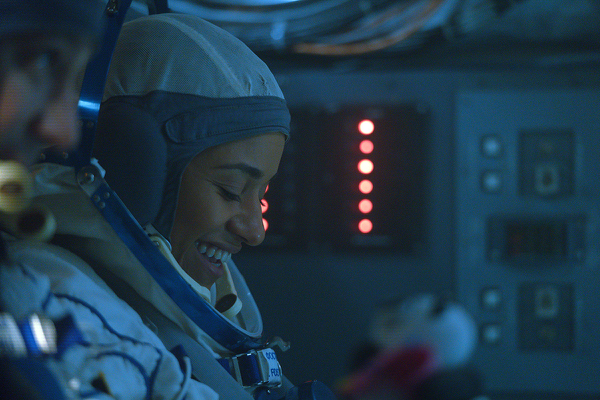Movie review by Greg Carlson
Science fiction thriller “I.S.S.” managed a woeful seventh place at the box office over its opening weekend, collecting 3 million dollars from a 2500+ theater release. To make matters worse, negative word-of-mouth will shut down any potential rebound. A small handful of critics have praised director Gabriela Cowperthwaite’s B-movie sensibilities, but the cumulative impact of the “Blackfish” documentarian’s movie – essentially left for dead in the January dumping-ground doldrums where theatrical releases wither and fade – is something less than the sum of its parts.
Oscar-winner Ariana DeBose leads the cast of six, a group of astronauts aboard the International Space Station faced with impossible decisions when nuclear war between the United States and Russia devastates Earth below. In December of 2020, the screenplay by Nick Shafir was included on Franklin Leonard’s Black List of best unproduced scripts. I don’t know how closely the finished film resembles the draft that received that honor, but much-needed intensity and paranoia is missing from the finished version. What should have been a roller coaster of shifting allegiances, filled with twists and turns alongside weighty political and philosophical puzzles pitting competition versus collaboration, never awakens from frustrating somnolence.
Instead of even the most rudimentary, reheated “2001: A Space Odyssey” leftovers, “I.S.S.” sidesteps the juiciest aspects of the logline, lurching toward “The Old Dark House” and “Alien” mathematics as the number of survivors moves in the direction of “And Then There Were None.” If you’re not paying close attention, the male cosmonauts Alexey (Pilou Asbæk) and Nicholai (Costa Ronin) look similar enough to mix up. Their colleague Weronika (Maria Mashkova), romantically involved with American skipper Gordon (Chris Messina), offers the most promising dramatic link between the increasingly wary teams, but Cowperthwaite is curiously stingy with character moments.
The sense of zero-gravity verisimilitude is so-so. Without the money to capture the most realistic onscreen depiction of weightlessness, actors were strapped into harnesses that would be digitally erased in post-production. The cheaper option doesn’t measure up to the razzle-dazzle of the big dogs, but fans of stuff like “Moon,” “High Life,” and “Prospect” will attest that audiences willingly suspend disbelief for something novel. “I.S.S.” production designer Geoff Wallace, who replicated what some refer to as the “clutter aesthetic” of the International Space Station, succeeds in suggesting believable conditions aboard the claustrophobic modules. But the authenticity of the sets is not enough.
It is unfair to make side-by-side comparisons between “I.S.S.” and something like Alfonso Cuaron’s Oscar-winner “Gravity,” released in 2013. Turns out, it’s also unfair to compare “I.S.S.” to Mario Bava’s “Planet of the Vampires” or Jim Lenahan’s “You Got Lucky” music video for Tom Petty and the Heartbreakers, both of which do a lot with a little. But the reality is that you can’t expect miracles without excellent writing and the imagination to capitalize on the most cinematic elements of space exploration. “I.S.S.” is sorely in need of a lot more strangeness, weirdness, and wonder. What kid hasn’t imagined what it might be like to spend time floating above our Big Blue Marble, doing important and amazing things in the name of science, discovery, and humankind?
